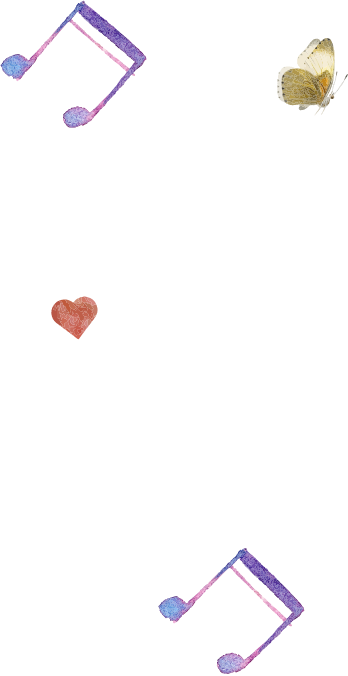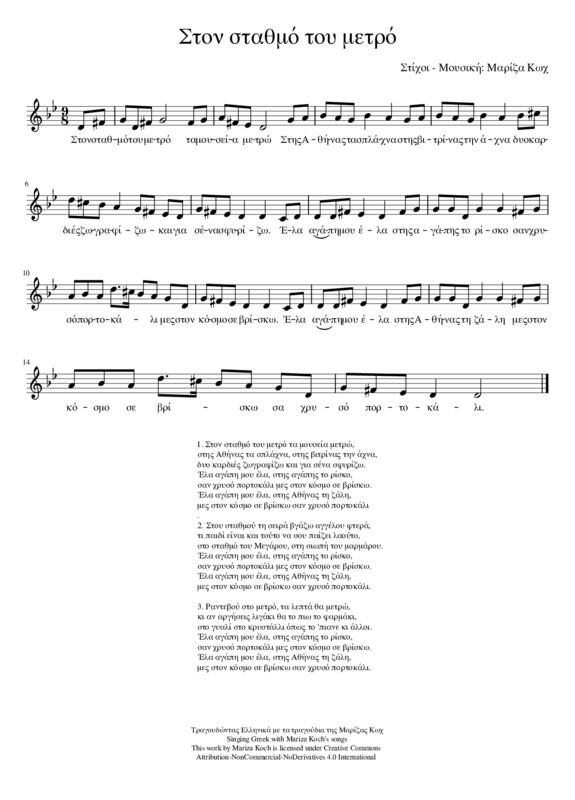
Sto stathmo tou metro

Sto stathmo tou metro
Speech Comprehension and Production
Τhe function of metaphor in poetic language. Search for the metaphors in the lyrics of the song that refer to the city of Athens: "στης Αθήνας τα σπλάχνα” (stēs Athēnas ta splachna), “στης βιτρίνας την άχνα” (stēs vitrinas tēn achna), “στης Αθήνας τη ζάλη” (stēs Athēnas tē zalē), “στη σιωπή του μαρμάρου” (stē siōpē tou marmarou).Create a text that refers to the city of Athens based on the metaphors of the song, in order to reflect the feeling of the city.
Figure of speech: repetition of the motivational verb “έλα” (come).
Explanation of the simile “σαν χρυσό πορτοκάλι” (san chryso portokali), reference to the myth of the Golden Apples in the Garden of Hesperides and analogy with love as a precious thing. Creation of poetic couplets using the genitive case e.g. the risk of love.||Refer to erotic poetry, from Saphō and Polydourē to contemporary lyricists and songwriters.
Figure of speech: synecdoche [“στο γυαλί στο κρυστάλλι” (sto gyali sto krystalli)].
Figure of speech: repetition of the motivational verb “έλα” (come).
Explanation of the simile “σαν χρυσό πορτοκάλι” (san chryso portokali), reference to the myth of the Golden Apples in the Garden of Hesperides and analogy with love as a precious thing. Creation of poetic couplets using the genitive case e.g. the risk of love.||Refer to erotic poetry, from Saphō and Polydourē to contemporary lyricists and songwriters.
Figure of speech: synecdoche [“στο γυαλί στο κρυστάλλι” (sto gyali sto krystalli)].
Music Activities
Perform the song using staccato and legato.
Practice rhythmic movements in 9/8 (3+2+2+2) and reference to other songs on the same rhythm [“Μη μιλάς άλλο για αγάπη” (mē milas allo gia agapē), “Τώρα που πας στην ξενιτιά” (tōra pou pas stēn xenitia), “Κάθε κήπος” (kathe kēpos)].
Refer to asymmetrical rhythms and mixed meters. Examples of Greek and foreign songs.
Divide the pupils into two groups: one group sings the melody of the song while the other sings with drone following the harmonic development of the song.
Practice rhythmic movements in 9/8 (3+2+2+2) and reference to other songs on the same rhythm [“Μη μιλάς άλλο για αγάπη” (mē milas allo gia agapē), “Τώρα που πας στην ξενιτιά” (tōra pou pas stēn xenitia), “Κάθε κήπος” (kathe kēpos)].
Refer to asymmetrical rhythms and mixed meters. Examples of Greek and foreign songs.
Divide the pupils into two groups: one group sings the melody of the song while the other sings with drone following the harmonic development of the song.
Cross-thematic Connections - Greek Culture
Interdisciplinary concept: space, communication-interaction.
Discuss the emotional expression of people and familiarize with the specific terminology for describing emotions (melancholy, boredom, frustration, surprise, conceitedness, indifference, enthusiasm, etc.)
The concept of communication framework: The space as an important factor for the communication of people.
Social and cultural limitations related to the expression of love, timeless and simultaneously.
Discuss the emotional expression of people and familiarize with the specific terminology for describing emotions (melancholy, boredom, frustration, surprise, conceitedness, indifference, enthusiasm, etc.)
The concept of communication framework: The space as an important factor for the communication of people.
Social and cultural limitations related to the expression of love, timeless and simultaneously.
Age level
11-15 years old
Language level
Advanced
Music
Ta chrōmatista tragoudia




